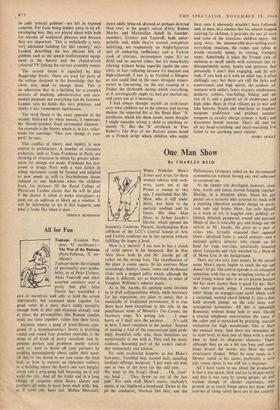for Fun All
Topkapi. (London Pav-
ilion, certificate.)— The War of the Buttons. (Paris-Pullman, 'X' cer- tificate.)
Istanbul, where a gang of jewel-thieves com- posed of a nymphomaniac's lovers is prowling round and round four priceless emeralds, is the scene of all kinds of pretty occasions and in- genious devices and problems neatly solved, such as: how to throw off your pursuers by padding meaninglessly about under their noses till they're too bored to see you make the final bolt, or how to execute an elaborate robbery in a building where the floor's one vast burglar alarm and a ping-pong ball bouncing on it will wake the city. And all the tricks end in a long climax of suspense when floors, alarms and pursuers all seem to have been dealt with; but, as it turns out, have not. Melina Mercouri,
more oddly behaved, dressed or perhaps directed than ever, is the gang's raison d'être; Robert Morley and Maximilian Schell its founder- members; Ustinov and Tamiroff, both unfor- gettable and, while they're around, completely satisfying, are respectively an Anglo-Egyptian spiv of endearing inefficiency and a Turkish cook of glorious, inconsequent rages. It's no Rififi and no marvel either, but it's remarkably relaxing without being soporific (quite the con- trary, in fact—relaxing because it's buoyant and high-coloured). I saw it, as frazzled a filmgoer as you could find in the most stringent experi- ments in fun-testing, on the wet evening of a Friday the thirteenth during which everything, as it astrologically ought to, had got snarled up; and came out of it beaming.
I had always thought myself an arch-fusser over what children see in the cinema, and having shaken the expected fist at the Bond films' A' certificate, which lets them inside, never thought I might consider taking a child to anything re- motely 'X.' But the 'X' certificate in Yves Robert's The War of the Buttons seems based on a French script which children who might have seen it obviously wouldn't have followed, and, at least, in a cinema that has almost stopped catering for children, it provides the sort of story and some of the situations children enjoy—the gang story, the innumerable-boys-spilling-over- everything situation, the rushes and rallies in woods 'eternally sunny, to rousing, trumpety tunes. Admittedly it takes the French view ot children as small adults with miniature but in- distinguishable tastes, habits and gestures, that personally I don't find engaging, and its atti- tude, if you look at it with an adult eye, is often chillingly coy; but there are still the larks and contrivances and high spirits, the outdoor ad- ventures with adders, foxes, tractors, mushrooms, donkeys, rabbits, tree-felling, fishing and the rest of it, and a general air of exuberance and high jinks. Boys in rival villages go to war and take buttons, braces and shoe-laces as trophies; weapons proliferate and produce counter- weapons (a cavalry charge arouses a tank), and discontent breeds treason. That's all, and for all my head-scratching and heart-searching I've failed to see anything more sinister.
ISABEL QUIGLY


































 Previous page
Previous page